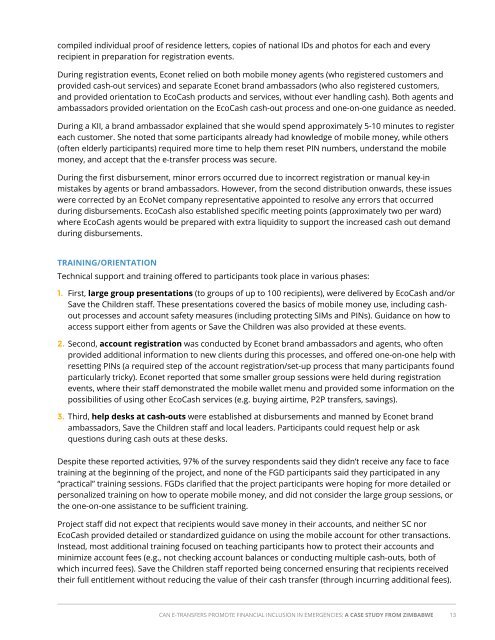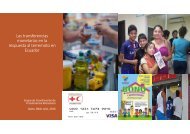Simatelele
2lF850q
2lF850q
You also want an ePaper? Increase the reach of your titles
YUMPU automatically turns print PDFs into web optimized ePapers that Google loves.
compiled individual proof of residence letters, copies of national IDs and photos for each and every<br />
recipient in preparation for registration events.<br />
During registration events, Econet relied on both mobile money agents (who registered customers and<br />
provided cash-out services) and separate Econet brand ambassadors (who also registered customers,<br />
and provided orientation to EcoCash products and services, without ever handling cash). Both agents and<br />
ambassadors provided orientation on the EcoCash cash-out process and one-on-one guidance as needed.<br />
During a KII, a brand ambassador explained that she would spend approximately 5-10 minutes to register<br />
each customer. She noted that some participants already had knowledge of mobile money, while others<br />
(often elderly participants) required more time to help them reset PIN numbers, understand the mobile<br />
money, and accept that the e-transfer process was secure.<br />
During the first disbursement, minor errors occurred due to incorrect registration or manual key-in<br />
mistakes by agents or brand ambassadors. However, from the second distribution onwards, these issues<br />
were corrected by an EcoNet company representative appointed to resolve any errors that occurred<br />
during disbursements. EcoCash also established specific meeting points (approximately two per ward)<br />
where EcoCash agents would be prepared with extra liquidity to support the increased cash out demand<br />
during disbursements.<br />
TRAINING/ORIENTATION<br />
Technical support and training offered to participants took place in various phases:<br />
1. First, large group presentations (to groups of up to 100 recipients), were delivered by EcoCash and/or<br />
Save the Children staff. These presentations covered the basics of mobile money use, including cashout<br />
processes and account safety measures (including protecting SIMs and PINs). Guidance on how to<br />
access support either from agents or Save the Children was also provided at these events.<br />
2. Second, account registration was conducted by Econet brand ambassadors and agents, who often<br />
provided additional information to new clients during this processes, and offered one-on-one help with<br />
resetting PINs (a required step of the account registration/set-up process that many participants found<br />
particularly tricky). Econet reported that some smaller group sessions were held during registration<br />
events, where their staff demonstrated the mobile wallet menu and provided some information on the<br />
possibilities of using other EcoCash services (e.g. buying airtime, P2P transfers, savings).<br />
3. Third, help desks at cash-outs were established at disbursements and manned by Econet brand<br />
ambassadors, Save the Children staff and local leaders. Participants could request help or ask<br />
questions during cash outs at these desks.<br />
Despite these reported activities, 97% of the survey respondents said they didn’t receive any face to face<br />
training at the beginning of the project, and none of the FGD participants said they participated in any<br />
“practical” training sessions. FGDs clarified that the project participants were hoping for more detailed or<br />
personalized training on how to operate mobile money, and did not consider the large group sessions, or<br />
the one-on-one assistance to be sufficient training.<br />
Project staff did not expect that recipients would save money in their accounts, and neither SC nor<br />
EcoCash provided detailed or standardized guidance on using the mobile account for other transactions.<br />
Instead, most additional training focused on teaching participants how to protect their accounts and<br />
minimize account fees (e.g., not checking account balances or conducting multiple cash-outs, both of<br />
which incurred fees). Save the Children staff reported being concerned ensuring that recipients received<br />
their full entitlement without reducing the value of their cash transfer (through incurring additional fees).<br />
CAN E-TRANSFERS PROMOTE FINANCIAL INCLUSION IN EMERGENCIES: A CASE STUDY FROM ZIMBABWE 13



